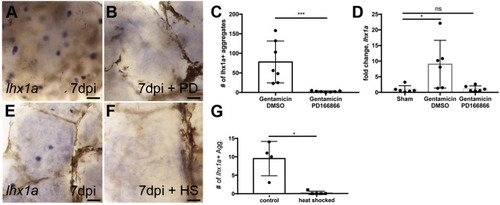Fig. 3
- ID
- ZDB-FIG-200330-3
- Publication
- Gallegos et al., 2019 - Fibroblast growth factor signaling mediates progenitor cell aggregation and nephron regeneration in the adult zebrafish kidney
- Other Figures
- All Figure Page
- Back to All Figure Page
|
Inhibition of Fgf signaling prevents new nephron development. (A) Injured zebrafish generate lhx1a ?+ ?nephrogenic aggregates at 7 dpi by whole mount in situ hybridization. (B) Treatment with the FGFR1 inhibitor PD166866 blocks the appearance of lhx1a ?+ ?nephrogenic aggregates in whole mount kidneys. (C) Quantification of lhx1a ?+ ?nephrogenic aggregates in multiple whole mount kidneys demonstrates PD166866 completely blocks kidney regeneration. N ?= ?7 fish per condition. Error bars indicate ąSD. p ?= ?0.01 by Mann-Whitney T-test. (D) qRTPCR quantitation of lhx1a expression shows PD166866 treatment blocks lhx1a expression post-injury. N ?= ?6 fish per condition. Error bars indicate ąSD. * indicates p ?= ?0.02 by Kruskal-Wallis test. (E) Control non-heat shocked Tg(hsp70:dnfgfr1) transgenic fish show lhx1a ?+ ?new nephron aggregates 7 days following gentamicin injury. (F) Heat shock induction of the dominant-negative Fgfr1 receptor blocked the development of lhx1a ?+ ?new nephron aggregates. (G) Quantification of lhx1a ?+ ?nephrogenic aggregates in multiple whole mount kidneys demonstrates that expression of the dominant-negative Fgfr1 receptor completely blocks kidney regeneration. Differences in injury responses (number of nephrogenic aggregates in A vs E) reflect strain dependent differences in sensitivity to gentamicin injury. N ?= ?4 control and N ?= ?5 heat shocked fish. Error bars indicate ąSD. p ?= ?0.03 by Mann-Whitney T-test. In panels A,B,E,F scale bars are 100 ??m. |
| Fish: | |
|---|---|
| Conditions: | |
| Observed In: | |
| Stage: | Adult |
Reprinted from Developmental Biology, 454(1), Gallegos, T.F., Kamei, C.N., Rohly, M., Drummond, I.A., Fibroblast growth factor signaling mediates progenitor cell aggregation and nephron regeneration in the adult zebrafish kidney, 44-51, Copyright (2019) with permission from Elsevier. Full text @ Dev. Biol.

